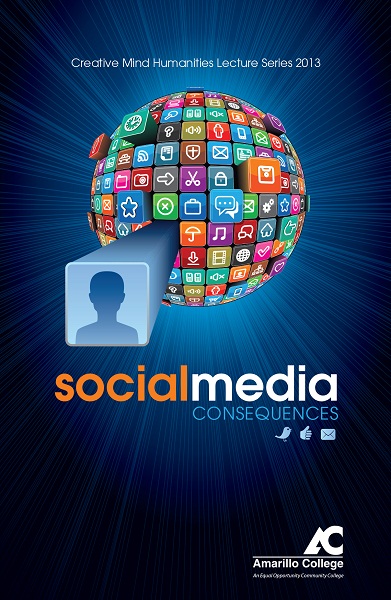

Comedian Jimmy Kimmel says he wants people to cut the fat from their Facebook accounts on National Unfriend Day, said Dr. Michael Austin to an audience of about 30 people at Amarillo College on April 4 on the Amarillo Museum of Art’s lower level.
The audience laughed.
Austin said the ABC network late-night talk-show host has actor William Shatner come on his show to simply say, “These people on Facebook, they’re not your friends.”
“That’s all, right, and he’s done,” said Austin, a philosophy professor at Eastern Kentucky University in Richmond.
“Jimmy Kimmel says if you want to know who your real friends are that are on Facebook, tell them you’re moving this weekend and you need some help.
“That’s how you’ll know, right, if they’re your friends or not.”
Austin said Kimmel starts off saying that friendship is a sacred thing.
“And I think that’s right,” he said.
Austin said Kristin Edford, humanities program coordinator, contacted him to speak as part of Amarillo College’s 2013 Creative Mind Humanities Lecture Series.
“Yes, I saw his article in Psychology USA about Facebook addiction, and that’s when I invited him. And his article’s online,” Edford said.
Austin said he got interested in social media and ethics from teaching a technology and values course.
Besides friendship, he discussed self-deception and self-knowledge and how they fit into social media during his lecture.
Referring to the work of the ancient Greek philosopher Aristotle, Austin discussed three types of friendship based on usefulness, pleasure or virtue.
Useful friends do things for us, he said. For example, they let us borrow class notes from them.
“We have tons of these relationships, right?” Austin said.
Friends for pleasure are people you just enjoy being around, he said.
Both useful and fun friendships have limits, Austin said.
“If that’s all that the relationship is based on, when the usefulness ends, the relationship ends,” he said. “Let’s say the person isn’t funny anymore, then the relationship would end.”
A deeper kind of friendship is based on virtue or completeness, Austin said. It requires a lot of time and trust.
Social media can prevent us from forming deep friendships, Austin said.
“Very simply, I mean, if we’re giving more attention to the screen in front of us than the people around us, it’s going to be hard to form deep friendships,” he said.
Austin said he thinks if a person’s primary way of relating to other people is on social media, forming deeper relationships will be difficult, because the medium is too limiting.
“Your close friends, they know you not just by the words you speak or type that you write into a machine,” he said.
Think about your friend’s or spouse’s non-verbal cues, Austin said.
“It’s their tone of voice, their facial expressions, their mannerisms, their body language,” he said. “All that stuff plays into who they are, right? So sometimes sarcasm or honesty, those things don’t come across, as well I’ve discovered on social media.”
His closest friends over the years are those with whom he has shared some struggle, such as in graduate school, Austin said.
Deep friends have to be able to see you, and you have to relate to them, he said.
“And it’s just entirely unclear to me how those kind of things can happen through social media; I just don’t see how they happen,” he said.
Deep friends can give accurate assessments about us because people have a tendency toward self-deception, he said.
“In short, it occurs when I manage my beliefs without regard for truth, OK? Can be a belief about myself, about others, about anything,” Austin said.
Self-deception is a major barrier to self-knowledge, he said.
Knowledge of our character – our strong and weak points and areas of inner moral struggle – is part of self-knowledge, he said.
Why does self-knowledge matter in the first place?
“I think it’s crucial for making free choices, and it can be conducive to happiness,” Austin said.
Gaining self-knowledge about our use of social media requires asking questions, including, “What does social media mean to me?” he said.
Austin said people should think about how they use social media and its positive and negative issues, such as brevity and ease of communication.
“The problem is, deeper communication, honest communication, is not easy, and it’s not always brief, right? It takes work; it takes effort,” he said.
“Finally, like any technology, I think it’s wise to think about these issues. We need to let our values dictate how we use social media rather than letting it dictate its values to us.”

Leave a Reply